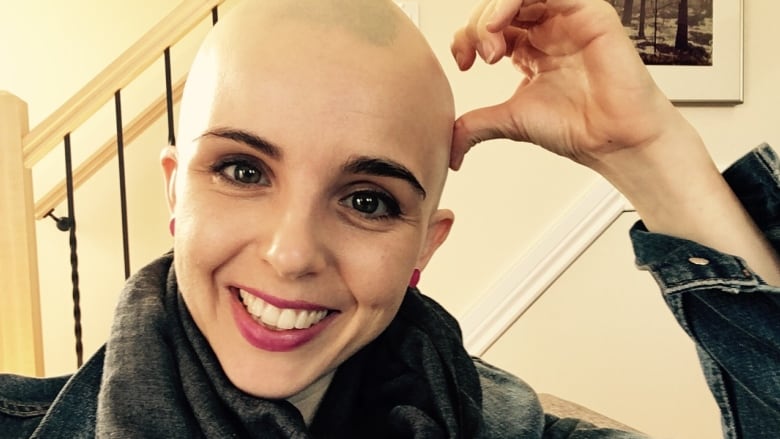'Just bald' Ottawa woman comes clean about life with alopecia
Auto-immune disease alopecia areata affects 2% of population

I'm a bald woman. But I haven't always been.
I lose my hair because of an auto-immune disease called alopecia areata, which causes hair loss and can affect hair all over the body.
The immune system, for unknown reasons, attacks the hair root and causes hair loss. Some people lose their hair all at once; others experience a gradual loss that may regrow.
As you can imagine, there is also a major psychological impact to losing your hair.
My hair began falling out the summer before high school. I'm 36 now. Which means for 22 years my hair has been in some dramatic stage — either falling out or growing back in.

For most of my life, I've been able to hide the bald patches. When I have a full head of hair, I have a lot of it. But when the baldness took over, I wore bandanas (high school), got creative with my hair style (always), and experimented with wigs (sometimes).
I tried not to talk about it because I didn't want to seem vain or self-absorbed to my friends.
It was only hair right? I wasn't in pain. What right did I have to complain? I didn't even like the term "auto-immune disease." I preferred "condition."

The next 'fall'
But even though I could hide it, I was always anxious about when the next "fall" would be. It felt like a shameful secret. Shameful because I felt I was wrong to make a big deal about nothing. But also shameful because I couldn't trust what I looked like. My reflection mocked me.
If I did tell a friend, or the boy I was dating, they would always reassure me it was no big deal. Which I tended to hear as "it could be worse."
Last year, I lost so much hair that shaving my head felt like my only option.
With my infant son on my lap, I sat in the hairdresser's chair bewildered but desperate to take control of my ever-changing reflection. In a few minutes, I was bald.

Life without hair
I found it hard to leave the house for the first few weeks.
When I did venture out, I was taken aback by my sudden notoriety. A bald woman is a curiosity. Standing in line at the grocery store, I'd often be praised for my "courage at facing cancer." Red-faced with concern about receiving support I was unworthy of, I'd quickly reassure the person I was healthy, "just bald."
Others stared. I wished myself invisible many times. I had no idea I once had anonymity on the street.
But I couldn't go back to hiding it, either. I'd never adapted to wearing wigs — associating them with theatre, or thinking of them as an accessory.

Coming Clean
So I wrote on Facebook, posting a picture of the new me. The support I received was overwhelming. I had no idea I needed it.
Two percent of the population is affected by alopecia areata. But you might not know it — because many are hiding it. Treatment options vary, and there is no magic pill.
There is a volunteer group — The Canadian Alopecia Areata Foundation — that raises awareness and money for research. In December of last year, I started CANAAF's Ottawa and Area Support Group. Our group has grown, meeting and sharing stories to support one another.

One of our hot topics: suggestions for keeping warm. (A person without hair is always cold). We also talk about finding wig-makers, and share tips for managing hair loss at school and work.
Recently, my bald patches started shrinking. So while I've just gotten used to seeing my tattooed eyebrows and bald head in the mirror, my body has decided that my hair might be making another comeback. For now.
The Ottawa and Area Support Group is holding an event "A Foxy Affair," Sunday, Oct. 28, 4 p.m. at the Mayfair theatre. It is a screening of Foxy — a film about a young woman who reveals she has alopecia.